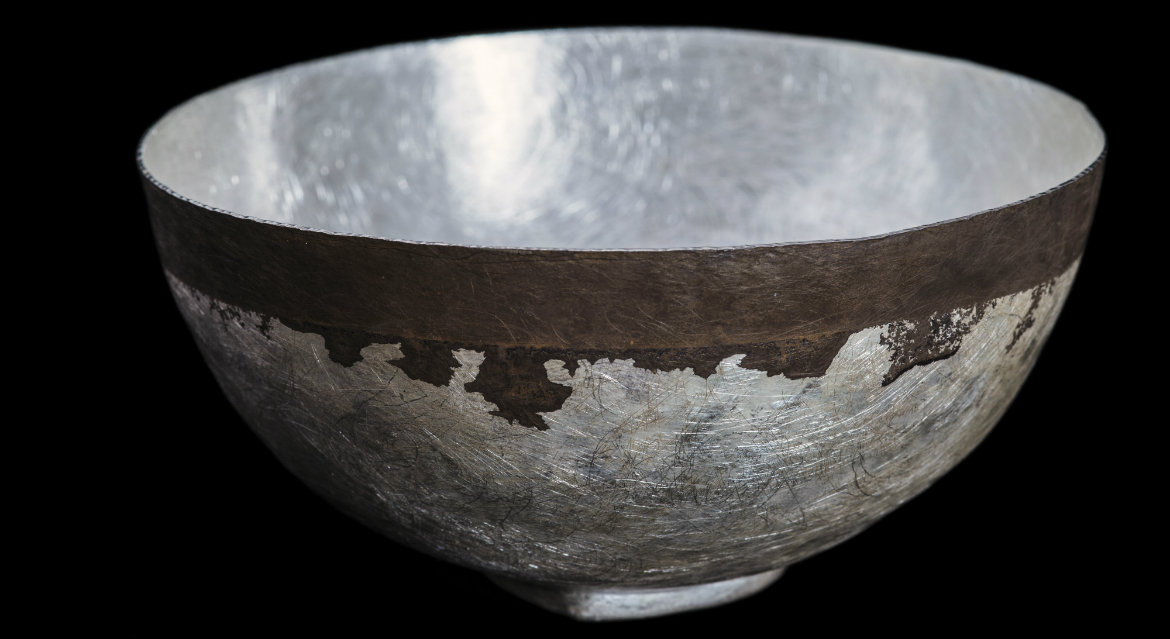Jewellery created from old circuit boards on display at exhibition
Published On Mon 15 Oct 2018 by Grant Hill

The next gold rush will not be in the hills of California but in landfill tips where prospectors will search for circuit boards rather than metal nuggets, according to an award-winning jewellery expert from the University of Dundee.
Dr Sandra Wilson, from Duncan of Jordanstone College of Art & Design, has been working with chemists at the University of Edinburgh on the recovery of precious metals from old electronics.
Bowls and necklaces she designed using gold and other metals recycled from circuit boards picked up on eBay will go on show at a major exhibition dedicated to ethical jewellery design and silversmithing later this week.
Perspectives – Creating Jewellery for a Fairer Future is being staged by the Incorporation of Goldsmiths of the City of Edinburgh as part of its Elements 4 festival of jewellery, silver and gold.
The supply of minerals like gold is diminishing rapidly while demand is rocketing and Dr Wilson sees the recovery of materials used in everything from mobiles, desktops, laptops and other devices as part of the solution.
“I was shocked to discover that only around 11% of precious metals are currently recovered from electronic waste,” she said. “Right now we consuming gold at such a rate that it could run out in a few decades. Recycling, recovery and reuse are the only options.
“I think that the next gold rush will not be in California but in the landfill sites in cities – it will be an urban gold rush. I would like to see additional marks, to sit alongside hallmarks that show the provenance of recovered gold.
“Just as many people choose to have heirloom jewellery reworked into fashionable new pieces, some may choose to do the same with old gadgetry. If you met on Tinder then you may feel your mobile had been fundamental to your relationship and want to use the gold from the circuit board in a wedding ring.”
Dr Wilson’s collaboration with the Love Group, headed by Jason Love Professor of Molecular Inorganic Chemistry at the University of Edinburgh, showed that techniques they are developing have a great deal of promise.
As the Love laboratory artist in residence she became aware that large volumes of electronic waste are required to make the recovered gold worthwhile and now hopes that we will see the growth of UK-based recovery centres where local jewellers can access gold.
And while it takes 41 redundant mobiles to yield a single gram of gold, the market is vast with around £15 billion of precious metals being used each year.
At the same time it is estimated that a million children are labouring in gold and silver mines around the world. They, and armies of adults, are exploited through low wages, unsafe working conditions and exposure to noxious chemicals.
Dr Wilson added, “People are looking for authenticity these days and I don’t think they want jewellery that has been mined by small children.”
Dr Wilson’s interdisciplinary work has already been recognised with awards from the Audi Foundation for Innovation and the British European Designers Group and items she designed are in the collection of HRH Princess Anne.
At Elements 4 she will be presenting two bowls and three necklaces each featuring materials recovered from waste. Some have mixed metals including gold and others use copper crystals. Each piece reflects her fascination with transforming materials from base to precious. The exhibition opens at the Incorporation of Goldsmiths of the City of Edinburgh on Friday 19 October.
Notes to editors:
Duncan of Jordanstone College of Art and Design:
- Based in the UK’s only UNESCO City of Design, and boasts an international reputation for quality teaching and research
- Number 1 in Scotland for Art & Design (Complete University Guide 2019)
- Ranked Top 10 in the UK for Art & Design (Times / Sunday Times Good University Guide 2019)
For media enquiries contact:
Grant Hill
Press Officer
University of Dundee
Nethergate, Dundee, DD1 4HN
Tel: +44 (0)1382 384768
Mobile: 07854 953277
Email: g.hill@dundee.ac.uk